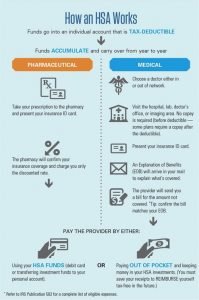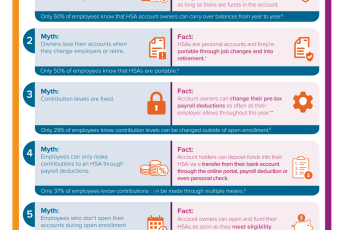With longer life spans come extended healthcare needs — and significantly more dollars required to pay for them. An HSA can help you plan for those expenses.
It’s more likely today that you’ll live longer than your grandparents did. The flip side is that you may spend far more on doctors’ bills and treatment for chronic illnesses than previous generations. With healthcare costs continuing to rise along with life expectancies, health savings accounts (HSAs) are an increasingly popular way to bridge the retirement and health savings gap. And now your HSA can integrate with your 401k so you have simple and easy access to all your retirement accounts
Most retirees are underfunding their future healthcare needs
 It’s very difficult to visualize a future unknown such as healthcare expenses — let alone set aside money to pay for them. But according to a 2021 research report,1 a 65-year-old couple retiring today will need $662,156 to cover their total lifetime healthcare costs. In addition, the average cost of a semiprivate room in a nursing home in 2020 was $255 per day2. Another report suggests a growing funding crisis: according to HSA Bank, 50% of consumers never set aside money specifically for future healthcare costs.3
It’s very difficult to visualize a future unknown such as healthcare expenses — let alone set aside money to pay for them. But according to a 2021 research report,1 a 65-year-old couple retiring today will need $662,156 to cover their total lifetime healthcare costs. In addition, the average cost of a semiprivate room in a nursing home in 2020 was $255 per day2. Another report suggests a growing funding crisis: according to HSA Bank, 50% of consumers never set aside money specifically for future healthcare costs.3
How HSAs work4
An HSA allows you to lower your federal income tax bill by making tax-free deposits into your HSA account each year. In order to contribute to an HSA, you must be enrolled in a high-deductible health insurance policy (HDHP), either through your employer or on your own. In 2021, the Internal Revenue Service has set minimum deductibility limits for HDHPs of $1,400 for individuals and $2,800 for families. You can’t be covered by another person’s health plan, and your income isn’t a factor in your eligibility.
There are yearly limits for deposits into an HSA. These limits for 2021 are:
- $3,600 for self-only HDHP coverage
- $7,200 for family HDHP coverage
Amounts are adjusted yearly for inflation. In addition, if you are age 55 or older at the end of your tax year, your contribution limit is increased by $1,000.
The amount you contribute to your account can be invested in basic interest-bearing accounts or funds, and the amounts deposited along with any earnings can be withdrawn tax-free at any time to pay for qualified medical expenses not covered by your HDHP (qualified expenses include items such as dental and vision costs, as well as preventive medications, such as sunscreen, bandages, and lip balm, among others). Unused HSA funds roll from year to year — and your account has the potential to grow until you take future withdrawals — which makes them a useful complement to your retirement plan.
If you withdraw funds from an HSA and don’t use them to pay for qualified medical expenses and you’re under age 65, you’ll have to pay tax on the full withdrawal amount plus a 20% penalty (so don’t do it unless you have a big emergency!) When you reach age 65, you’re allowed to draw from any unspent HSA funds without taxes or penalty if you use them for medical expenses.
You can also use your HSA to pay for medical expenses of a spouse or other family member — even if they are not covered by your health insurance. If your employer offers an HSA, you can take your account with you when you retire or change jobs.
If you’re healthy and don’t anticipate having much in the way of medical expenses as you get older, an HSA can be an excellent long-term tax-advantaged investment. But if you wind up needing long-term care not covered by Medicare, a well-funded HSA may be able to fill any short-term funding gap — giving you and your loved ones peace of mind.
Ready to discuss your retirement plan with a 401(k) Advisor?
- HealthView Services 2021 Retirement Healthcare Costs Data Report. https://hvsfinancial.com/wp-content/uploads/2020/12/2021-Retirement-Healthcare-Costs-Data-Report.pdf
- Genworth 2020 Cost of Care Survey. https://www.genworth.com/aging-and-you/finances/cost-of-care.html
- HSA Bank Health and Wealth IndexSM. HSA Bank, March 9, 2021. https://www.hsabank.com/hsabank/Campaign/Digital-2021/hsa-bank-health-and-wealth-index-2021-download
- “Health Savings Accounts: is an HSA Right For You?” Mayo Clinic, March 25, 2021. https://www.mayoclinic.org/healthy-lifestyle/consumer-health/in-depth/health-savings-accounts/art-20044058
Disclosures:
This material was created for educational and informational purposes only and is not intended as ERISA, tax, legal or investment advice. If you are seeking investment advice specific to your needs, such advice services must be obtained on your own separate from this educational material.
© 2021 Kmotion, Inc. This article is a publication of Kmotion, Inc., whose role is solely that of publisher. The opinions in this article are those of Kmotion. The article and opinions are for general information only and are not intended to provide specific advice or recommendations for any individual. Nothing in this publication shall be construed as providing investment counseling or directing employees to participate in any investment program in any way. Please consult your financial advisor or other appropriate professional for further assistance with regard to your individual situation.
Kmotion, Inc., 412 Beavercreek Road, Suite 611, Oregon City, OR 97045; www.kmotion.com
#05130465








